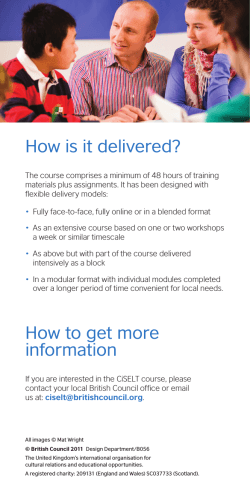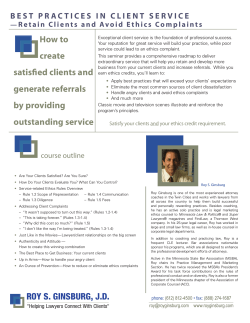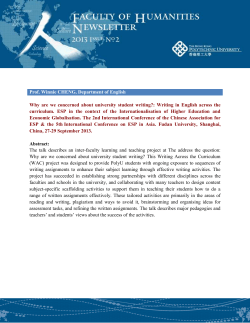
1 EDU 566 Northern Kentucky University
1 EDU 566 Northern Kentucky University College of Education and Human Services EDU 566 Assessment in Early Childhood Education 3 credit hours Tuesdays 4:30 – 7:15 BEP 158 "Committed to the Development of All Learners" The students, faculty, staff, and community of the NKU educational programs are committed to the development of all learners through active collaboration and participation in coursework, projects, and field experiences. The education programs in the College of Education and Human Services prepare exemplary helping professionals who demonstrate the personal and professional knowledge, skills, and dispositions necessary to provide for the developmental needs of individuals in an increasingly diverse, complex, and technological society. KERA Initiatives As students complete and implement projects and assignments throughout their education programs they will address all components of the KERA initiatives: Kentucky Learning Goals and Academic Expectations, the Kentucky Program of Studies, and the Core Content for Assessment. EPSB Themes All NKU professional education programs address and affirm the value of diversity in education, the importance of helping all children develop reading and literacy skills, attaining high levels of skill in assessing the outcomes of instruction, and using those skills to develop strategies for closing identified achievement gaps. This course will provide students an opportunity to demonstrate their knowledge, skills, and dispositions in the particular theme(s) of: Closing the Achievement Gap Honor Code and Code of Ethics The work you do in this course is subject to the NKU Student Honor Code, http://www.nku.edu/~deanstudents/documents/StudentHonorCode-Fall2007.pdf. Students in the education programs must also adhere to the education programs’ Code of Ethics: http://coehs.nku.edu/docs/COEHS_code_ethics_20.doc. The Code of Ethics includes “consistently attending classes” and treating others with respect. Did you know that “disrespect may be manifested in many ways including both 2 EDU 566 verbal and non-verbal communications (i.e. putting one’s head on the desk during class, doing other work in class, talking while someone’ else is talking….). The code of ethics says “If these standards are not met, then faculty have the authority to dismiss the student from the class or field assignment, revoke admission to the Teacher Education Program,…” If the Code of Ethics is violated your final grade will be impacted. Laptop Computer Use: Use of laptop computers must be for class work only including taking notes or following along with a class PowerPoint. Doing other work during class, sending emails or instant messages, and displaying material that may be distracting or offensive to you classmates is disrespectful and is considered a violation of the Code of Ethics. If the Code of Ethics is violated your final grade will be impacted. If inappropriate laptop use is noted, you will be asked not to bring it back to class. Cell Phone Use: Please put cell phones on silent or vibrate so as not to disturb or disrupt the class. Talking on the phone or sending messages during class is disrespectful and considered a violation of The Code of Ethics. If the Code of Ethics is violated your final grade will be impacted. If you must take a phone call due to a personal or work related emergency, please leave the room to do so and find out what work you missed during your absence. Plagiarism: Plagiarism or cheating will result in an "F" for the course and recommendation for dismissal” as is written in the graduate catalog under academic honesty. Students With Disabilities Students with disabilities who require accommodations (academic adjustments, auxiliary aids or services) for this course must register with the Disability Services Office. Please contact the Disability Service Office immediately in the University Center, Suite 320 or call 859-572-6373 for more information. Verification of your disability is required in the Disability Services Office for you to receive reasonable academic accommodations. Professor: Helene Harte, EdD. Office: BEP 263B Telephone: 859-572-7686 Office Hours: Monday 3:00 - 4:00pm Tuesday 2:00 – 3:00pm By appointment Email: harteh1@nku.edu Textbook: Puckett, M. B. & Black, J. K. (2008). Meaningful assessments of the young child: Celebrating development and learning. Upper Saddle River, NJ: Merrill Prentice Hall. Additional Articles will be posted on Blackboard. 3 EDU 566 Student Activities, Evaluation, and Grading Policy: Students will attend all class meetings and participate in class discussion and group activities. In addition, students will complete the following assignments: Undergraduate Attendance and Participation Assessment Tool Review and Presentation Reflective Journal Observation and Report Team Project Pre & Post Reflection on Feelings of Assessment TOTAL 15% or 30 points 15 % or 30 points 20% or 40 points 15% or 30 points 25% or 50 points 10% or 20 points 100% or 200 points TOTAL 13.64% or 30 points 13.64 % or 30 points 27.27% or 60 points 13.64% or 30 points 22.72% or 50 points 9.09% or 20 points 100% or 220 points Graduate Attendance and Participation Assessment Tool Review and Presentation Reflective Journal Observation and Report Team Project Pre & Post Reflection on Feelings of Assessment *Any of these assignments may be used as an on-demand task or a portfolio entry to demonstrate student competence. Assignments will be given a letter grade based on departmental grading policy and the scoring guidelines which accompany each assignment. Graduate Grading Scale: Undergraduate Grading Scale: Grade Percent Total Points Needed Grade Percent Total Points age age Needed A 93.5% 93.50 -100.00 A 90% - 100% 90.00 -100.00 B 100% 82.00 - 93.49 B 80% - 89.9% 80.00 – 89.99 C 82% 70.00 – 81.99 C 70% - 79.9% 70.00 – 79.99 F 93.4% Anything below 70 D 60% - 69.9% 60.00 – 69.99 71% points F Below 60% Anything below 60 81.9% points Below 71% Teaching and learning are interactive. As such, excessive or unexcused absences, limited participation, and/or inappropriate dispositions may result in a lowered grade regardless of your performance on graded components of this course. No LATE assignments will be accepted without prior instructor approval. For Graduate Students, anything below 75% is an F (Unacceptable) 4 EDU 566 • As a graduate student, you are expected to demonstrate depth of knowledge and thorough understanding in your assignments/projects through synthesis as well as evaluation of materials from various sources in the research literature; integration of ideas and information across courses; and use most recent edition of American Psychological Association (APA) style in your writing. As such, your grade will reflect your depth of knowledge level. • All IECE majors must earn a grade of C or better in order for this course to count toward program completion. Description of Course Projects: (Rubrics will be provided) Attendance and Participation (30 points) Teaching and learning are interactive. As such, excessive or unexcused absences, limited participation, and/or inappropriate dispositions will result in a lowered grade regardless of your performance on graded components of this course. No LATE assignments will be accepted without prior instructor approval. If you are unable to attend class due to illness, work or family obligations you are expected to contact the instructor in advance for an excused absence. Assessment tool review and presentation (30 points) You will review an assessment tool and provide a written report to identify and evaluate the purpose, appropriateness, reliability and validity of the instrument used in the assessment/evaluation of young children. Each person will create a 10 minute presentation about an assessment tool Reflective Journal (10 points each)You will write 4-6 reflections (4 for undergraduates, 6 for graduates) on research articles about young children and assessment. Research articles must come from peer reviewed journals and be related to assessment of young children. Each reflection must briefly summarize the key points and include your opinion if what the author is trying to communicate in the article. Each reflection must answer the following questions: What new information did you obtain from the research article? What are the major implications of assessment of young children and your professional development? What methodology was used in the research? Observation and report (30 points) Using an approved assessment tool, you will complete an initial developmental observation of an infant, toddler, or a preschooler. You will write a report which includes a brief environmental evaluation and documented information regarding the behavior, interactions, abilities and needs of the observed child. Team project (50 points) With a team of your classmates, you will be responsible for completing an assessment of a preschool child and writing an integrated assessment report. Although you will be working collaboratively, each person will receive his or her own points. Pre & Post reflection on feelings of assessment (10 points each) At the beginning of the semester, you will write a two-page minimum personal reflection about your ideas and opinions regarding assessing young children. You can use your personal experiences, those of family, friends, or colleagues. At the end of the semester, you will write a final reflection which encompasses the concepts, content and terminology you have learned over the course of the semester to determine if your feelings or opinions have changed or have been strengthened as a result of what you learned. Course Description and Objectives: 5 EDU 566 This course will provide for pre-service and in-service educators guidelines to create an on-going assessment system that incorporate both formal and informal, more authentic, performance or process based assessments without compromising developmentally appropriate practices. Future and current teachers will be able to utilize curriculum-based assessment techniques to observe and document growth, development and learning. They will be able to make valid inferences from observations and assessment procedures. They will be able to use information to collaborate with individual learners and their families to support learners’ progress. The purpose of this course is to teach students the curriculum standards and teaching methods necessary for a professional career as a teacher. The course addresses these Kentucky Teacher Standards (means of assessment in boldface): Standard I Designs and Plans Instruction a. Designs for all children developmentally appropriate, comprehensive curriculum, instruction, and learning outcomes aligned with program, school, district, state, and/or federal goals. Assessment tool review and presentation, Observation and report, Team project b. Includes assessments that target learning outcomes. Assessment tool review and presentation, Observation and report, Team project c. Individualizes curriculum, instruction plans, and assessment strategies for ALL children. Assessment tool review and presentation, Observation and report, Team project d. Plans for effective involvement of team members, including assistants, staff, and volunteers, across learning environments. Assessment tool review and presentation e. Includes knowledge and strategies of multiple disciplines. Assessment tool review and presentation f. Plans experiences and instruction based on family resources, priorities, and concerns. Assessment tool review and presentation, Observation and report, Standard IV Assesses & Communicates Learning Results a. Uses a systematic process to assess and record children’s ongoing developmental progress. Assessment tool review and presentation, Observation and report, Team project b. Bases assessment strategies on developmentally appropriate learning outcomes and aligns strategies with the program curriculum and appropriate standards. Assessment tool review and presentation, Team project d. Plans and implements assessment strategies that invite active involvement of appropriate partners, including team members and children’s families. Assessment tool review and presentation, Team project e. Accurately interprets the data and validity of assessment results and communicates results to appropriate partners, including families, in terms they easily understand. Observation and report, Team project f. Uses assessment results to design appropriate learning outcomes and to plan for future related services and instruction. Assessment tool review and presentation, Team project Standard V Reflects on and Evaluates Professional Practices a. Uses data to reflect on and evaluate children’s learning. Observation and report, Reflective Journal b. Uses data to reflect on and evaluate instructional practice. Reflective Journal 6 EDU 566 c. Uses data to identify areas for professional growth. Reflective Journal d. Analyzes the involvement and effectiveness of team members in instruction. Reflective Journal, Team Project Standard VII Engages in Professional Development a. Assesses his/her professional performance level relative to KY IECE Teacher Standards. Reflective Journal Standard IX Demonstrates Implementation of Technology e. Demonstrates ethical and legal use of technology disciplines. Assessment tool review and presentation, Reflective journal, Observation and report, Team project Tentative Class Schedule – Spring 2008 (Schedule subject to change) Date WEEK 1 January 13 WEEK 2 January 20 WEEK 3 January 27 WEEK 4 February 3 Topic Introductions Course Overview Meaningful Practices The Big Picture Formal Assessments Assignment(s) Due Read Chapter 1 Read position statement on assessment from NAEYC Read Chapter 2 Personal reflection on assessment due Share your reflection Read Chapter 3 pp. 54-87, – A Planning Format for Meaningful Assessment I: Formal Assessments of Young Children Reflective Journal #1 Read article posted on Blackboard – Kentucky’s Early Childhood Continuous Assessment and Accountability System. Reflect critically on this article. WEEK 5 February 10 Informal Assessments WEEK 6 February 17 Portfolio Development (Guest Lecture) Week 7 The Importance of Sign your group up for Assessment Report and Presentation on a Young Child. Read Chapter 4 Reflective Journal #2 due Read Chapter 5 Reading posted on Blackboard 7 EDU 566 February 24 Observation WEEK 8 March 3 Children’s SelfAssessment WEEK 9 March 10 WEEK 10 March 17 WEEK 11 March 24 WEEK 12 March 31 Spring Break Collaborating with Families Making Assessment Meaningful Program Evaluation WEEK 13 April 7 Week 14 April 14 Week 15 April 21 Week 16 April 28 Work day for group presentations Assessment Tool Week 17 May 5 Wrap up Assessment Reports of Young Child Assessment Reports of Young Child Reflective Journal #3 due Read Chapter 6 pp. 140 – 167 Reflective Journal #4 due No Class Read Chapter 7 Graduate students: Reflective Journal #5 due Read Chapter 8 Graduate -- Graduate students: Reflective Journal #6 due Read Chapter 9 Observation Report due No class Individual Presentations of assessment tools Team Reports of a Young Child Remaining Team Reports of a Young Child Instructor will give out final reflection prompt. End of Semester Celebration Final Reflection due Bibliography Bailey, D.B. & Simeonsson, R.J. (1988). Family assessment in early intervention. Columbus, OH: Merrill. Beaty, J.J. (2002). Observing development of the young child, 5th Edition. Columbus, OH: Merrill Prentice Hall Bondurant-Utz, J. (2002). Practical guide to assessing infants and preschoolers with special needs. Columbus, OH: Merrrill Prentice Hall Bracken, B.A. (Ed.). (2000). The psychoeducational assessment of preschool Children, 3rd edition. Boston, MA: Allyn & Bacon. Bredekamp, S. & Rosegrant, T. (Eds.). (1993). Reaching potentials: Appropriate curriculum and assessment for young children Volume 1. Washington, D.C.: National Association for the Education of Young Children. 8 EDU 566 Cohen, L. & Spenciner, L.J. (1994). Assessment of young children. White Plains, NY: Longman. Cohen, L.G. & Spenciner, L.J. (1998). Assessment of children and youth. New York: Addison Wesley Longman, Inc. Cohen, D. H., Stern, V., & Balaban, N. (1983). Observing and recording the behavior young children, 3rd Edition. New York: Teacher’s College Press. of Linder, T. W. (1993). Transdisciplinary play-based assessment: A functional approach to working with young children. Baltimore: Paul H. Brookes Publishing. Losardo, A. & Notari-Syerson, A. (2001). Alternative approaches to assessing young children. Baltimore, MD: Paul H. Brookes. Noonan, M.J. & McCormick, L. (1993). Early intervention in natural environments: Methods and procedures. Belmont, CA: Brooks/Cole. Puckett, M.B. & Black, J.K. (2000). Authentic assessment of the young child: Celebrating development and learning, 2nd edition. Columbus, OH: Merrill Prentice Hall. Waters, J., Frantz, J. F., Rottmayer, S. , Trickett, M., & Genishi, C. (1992). Learning to see the learning of preschool children. In Ways of Assessing Children and Curriculum, C. Genishi, (Ed.) NY, NY: Teachers College Press. 9 EDU 566 For Education Majors Only Students in the education programs must also adhere to the education programs’ Code of Ethics: http://coehs.nku.edu/docs/COEHS_code_ethics_20.doc and the KY Code of Ethics: http://www.kyepsb.net/legal/ethics.asp. Additional information for education majors: Committed to the Development of All Learners is the theme that undergirds the Conceptual Framework for all professional programs in the College of Education and Human Services (COEHS) at Northern Kentucky University. The Conceptual Framework is supported by the missions of the university and the college and used by faculty to continuously assess and update the curricula of the Unit’s initial and advanced programs. The Unit created its Conceptual Framework after input from all of its constituents: education and arts and science faculty, students, staff, and community members. The graphic depicts a framework of continuously assessing the knowledge, skills, and dispositions that classroom teachers, instructional leaders, and school counselors must have to facilitate student learning and academic achievement. KERA Initiatives As students complete and implement projects and assignments throughout their education programs they will address all components of the KERA initiatives: Kentucky Learning Goals and Academic Expectations, the Kentucky Program of Studies, and the Core Content for Assessment. EPSB Themes All NKU professional education programs address and affirm the value of diversity in education, the importance of helping all children develop reading and literacy skills, attaining high levels of skill in assessing the outcomes of instruction, and using those skills to develop strategies for closing the achievement gap. This course will provide students an opportunity to demonstrate their knowledge, skills, and dispositions in the particular theme of reading/ literacy. 10 EDU 566 Kentucky Teacher Standard No. 1 STANDARD 1: THE TEACHER DEMONSTRATES APPLIED CONTENT KNOWLEDGE. 1.1 Communicates concepts, processes, and knowledge Accurately and effectively communicates concepts, processes and/or knowledge and uses vocabulary that is clear, correct and appropriate for students. 1.2 Connects content to life experiences of student. Effectively connects most content, procedures, and activities with relevant life experiences of students. 1.3 Demonstrates instructional strategies that are appropriate for content and contribute to student learning. Uses instructional strategies that are clearly appropriate for the content and processes of the lesson and make a clear contribution to student learning. 1.4 Guides students to understand content from various perspectives. Provides opportunities and guidance for students to consider lesson content from different perspectives to extend their understanding. 1.5 Identifies and addresses students’ misconceptions of content Identifies misconceptions related to content and addresses them during planning and instruction.
© Copyright 2025


















